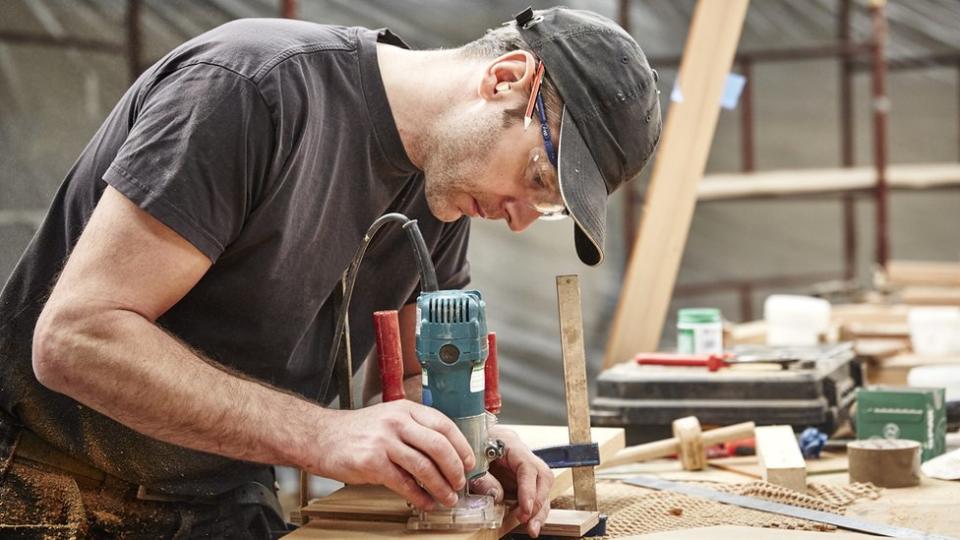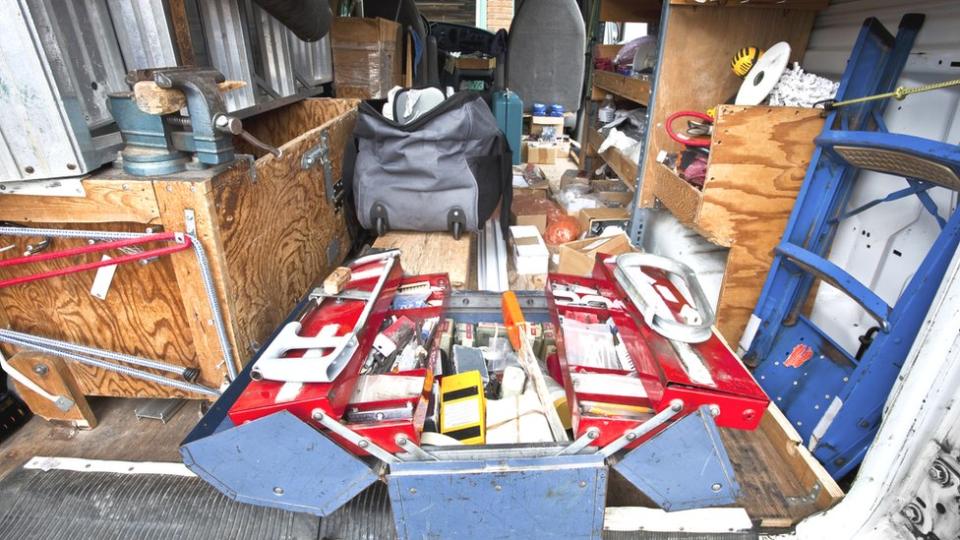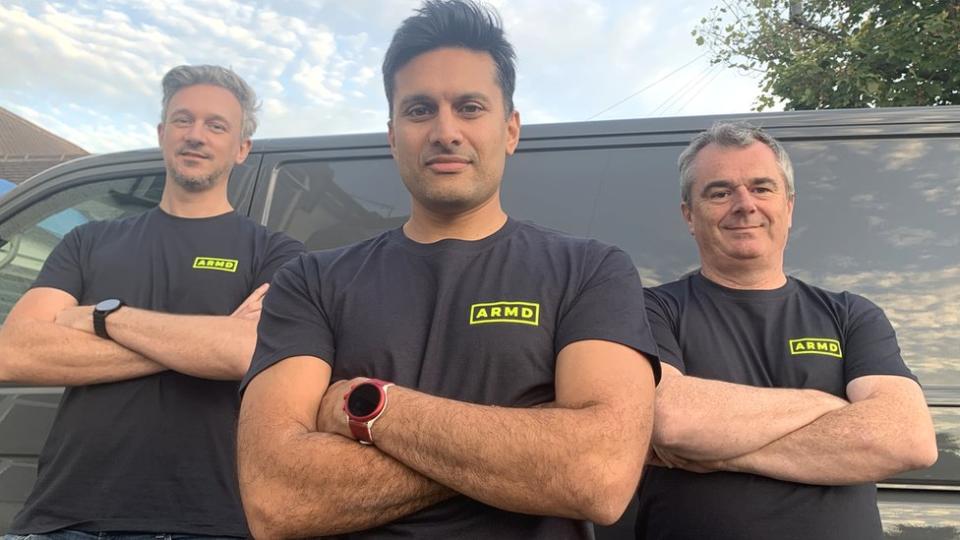
It was his van alarm that woke him up. At 2:30 in the morning.
As carpenter Derek (not his real name), who lives in the Midlands, raced downstairs and out to his front garden, he heard the thieves making their getaway into the night.
Derek has had his tools stolen more than a dozen times in his career, he says.
Once, criminals struck in broad daylight while he was unloading his van at a job.
“They actually told me that if I was to call the police on them, they would come back and kill my family,” he recalls.
“You don’t sleep then for the next couple of days, you’re panicking about them coming back again.”
The burglary in the middle of the night, last autumn, felt like the last straw. As Derek totted up the value of the stolen tools – £7,000’s worth, he estimates – despair hit.
Was it even worth carrying on with carpentry, the job he’d done since he left school? “I was ready to jack it in,” he says.

Tool theft is a shockingly common crime. According to insurer Direct Line, a tool is stolen from a tradesperson every 17 minutes in England, Wales and Northern Ireland.
Those affected say it is much more than an inconvenience. Insurance claims can be complicated and don’t always cover the cost. You might lose days or even weeks of trade while sourcing replacement kit. And it can affect your mental health.
But there is technology out there designed to help prevent tool theft, or at least reduce the hassle should it happen.
When Devin Chawda and Stephen Holland showed off a security camera they had developed at a trade show a few years ago, builders and electricians kept asking them if it was something they could put inside their van.
That’s why they founded ARMD, a firm that specialises in anti-tool theft tech and insurance.
“In the event someone breaks in, you instantly get alerted, you can take action, you can record, you can alert the police,” says Mr Chawda on Zoom as his fellow co-founder Mr Holland holds up the small motion sensor and location tracker designed for commercial vehicles.
There’s a separate hub containing a SIM card that can be hidden in the front of the van. It connects the system to a mobile network. If someone unplugs the hub, that triggers an automated phone call alerting the owner.

Still, the tech isn’t necessarily enough, suggests Mr Holland.
“To get them back to work became our mission,” he says, as he explains how in late 2021 ARMD launched an insurance product designed specifically for tradespeople.
The coverage is linked to a special smartphone app.
It is a digital inventory of every valuable bit of equipment a plumber or builder might have and displays the insurance claim value of each tool. For a new tool, this figure starts at 100% of its retail value and reduces each year by 10%, down to a minimum of 50%, says Mr Chawda.
Crucially, ARMD aims to pay out genuine claims as quickly as possible. The firm has about 80 customers signed up so far and has settled 7 claims in total. The longest of those took just three days.
There are alternative technologies designed to help combat the effects of tool theft.
A tool inventory app called The Tool Register, available for smartphones, was listed in a research briefing on tool theft published by the House of Commons Library last year, for example.
A spokesman for uWatch, which makes the app, says it has about 500 users. uWatch also offers a security device called The Cube, fitted with a camera as well as motion and location sensors among others.
“There are members who are literally putting cages inside their vehicles,” says Darren Crannis, technical manager at the Electrical Contractors’ Assocation (ECA), which represents 3,000 member companies covering a total of 27,000 individual tradespeople.
Some even choose to put fake logos on their vans, obscuring that they are in a building trade, hiding the fact there could be tools in the vehicle, he says.
Tradespeople may also install covert cameras in vans, apply forensic marking products such as microdots to their tools, and label them as protected, for example. And there’s a range of heavy duty locks, vaults and alarm systems to secure equipment whether it is kept in a van or a shed, for instance.
“Have you seen the most recent James Bond where only he can hold his gun and it works?” says Mr Crannis. “That really would be brilliant.”

Some real-world tech does, actually, come close. Tool brand Milwaukee, for instance, launched a system called One-key in 2016. It uses sensors clipped onto, or built inside, tools that link to a tradesperson’s smartphone via Bluetooth. You can choose to set up a geofence, a specific area on a map, so that if a tool is taken outside that area, an alert pops up.
From there, you can track the tools, but only if they come into the range of a phone with the app installed.
Milwaukee says it has around 400,000 users across Europe, whose smartphones provide a kind of patchwork of detectors dotted around the continent.
It is also possible to disable some Milwaukee tools remotely, meaning they won’t work until recovered and reactivated. The firm is developing versions of its tracking devices for removable tool batteries as well, since large batteries can sometimes cost hundreds of pounds.
“If the technology’s there, we need to start using it,” says Andy Hartley, key account manager for building firm GCL, and south east regional chairman at the ECA. He recalls working on one job site in London where he estimates tools were repeatedly stolen – on between 10 and 15 occasions.
But how far will any of this help if demand for stolen tools remains high? “It’s indicative of a market within the building industry that is rife. Where are these tools going?” says Brian Berry, chief executive of the Federation of Master Builders.
He suggests that licensing or tighter regulation of building companies could help.
Tradespeople who spoke to the BBC suggested that tool theft was commonly reported to the police, but that prosecutions or successful recoveries of stolen tools were extremely rare.
A spokesman for the National Police Chiefs Council said: “There are complexities in tool theft cases as there are limited forensic opportunities. We will continue to work hard to prevent tool theft and encourage victims to report these instances to police.”
In Derek’s case, he reported last year’s burglary immediately. He hasn’t heard anything since, however.
The incident was nearly enough to end his carpentry business, but friends encouraged him to keep going.
However, he still hasn’t been able to cover the cost of replacing all the tools taken in the last burglary.
“It’s like starting from scratch,” he says.











